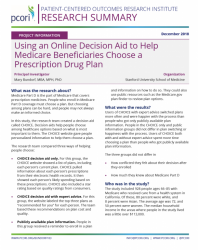You are looking at an archived version of our site. Please visit thepcc.org for a fresh, new experience!
You are here: Array » Using an Online Decisi ...
Using an Online Decision Aid to Help Medicare Beneficiaries Choose a Prescription Drug Plan

What was the research about?
Medicare Part D is the part of Medicare that covers prescription medicines. People who enroll in Medicare Part D coverage must choose a plan. But choosing among plans can be hard, and people may not always make an informed choice.
In this study, the research team created a decision aid called CHOICE. Decision aids help people choose among healthcare options based on what is most important to them. The CHOICE website gave people personalized information to help them choose a plan.
The research team compared three ways of helping people choose:
- CHOICE decision aid only. For this group, the CHOICE website showed a list of plans, including each person’s current plan. CHOICE pulled information about each person’s prescriptions from their electronic health records. It then showed each person’s likely spending based on these prescriptions. CHOICE also included a star rating based on quality ratings from consumers.
- CHOICE decision aid with expert advice. For this group, the website labeled the top three plans as “recommended for you” for each person. The team based these recommendations on plan cost and quality.
- Publicly available plan information. People in this group received a reminder to enroll in a plan and information on how to do so. They could also use public resources such as the Medicare.gov plan finder to review plan options.
What were the results?
Users of CHOICE with expert advice switched plans more often and were happier with the process than people who got only publicly available plan information. People in the CHOICE only and public information groups did not differ in plan switching or happiness with the process. Users of CHOICE both with and without expert advice spent more time choosing a plan than people who got publicly available plan information.
The three groups did not differ in
- How conflicted they felt about their decision after they enrolled
- How much they knew about Medicare Part D
Who was in the study?
The study included 928 people ages 66–85 with Medicare who received care from a health system in California. Of these, 80 percent were white, and 8 percent were Asian. The average age was 72, and 50 percent were women. The median household income in the areas where people in the study lived was a little over $113,000.
What did the research team do?
The study took place in Fall 2016 when people were choosing a plan for 2017. After enrolling people in the study, the research team assigned them by chance to one of the three ways to help people pick a plan.
People took surveys at the start and end of the study. The surveys asked
- Whether people switched plans
- How happy they were with the choice process
- How much time they spent choosing a plan
- How conflicted they felt about their decisions
- How much they knew about Medicare Part D
Older adults with Medicare, a caregiver, a pharmacist, and medical foundation staff gave input on the CHOICE website. They also helped with recruitment.
What were the limits of the study?
People in the study lived in areas where many people have high incomes. Results may differ for people on Medicare who live in low-income areas.
Future research could study people’s satisfaction with plans chosen using the CHOICE website over the long term.
How can people use the results?
Groups that help people enroll in Medicare could use these results when considering whether to offer a decision aid like CHOICE to help people choose a Part D plan.
Secondary menu
Copyright © 2024 Primary Care Collaborative



